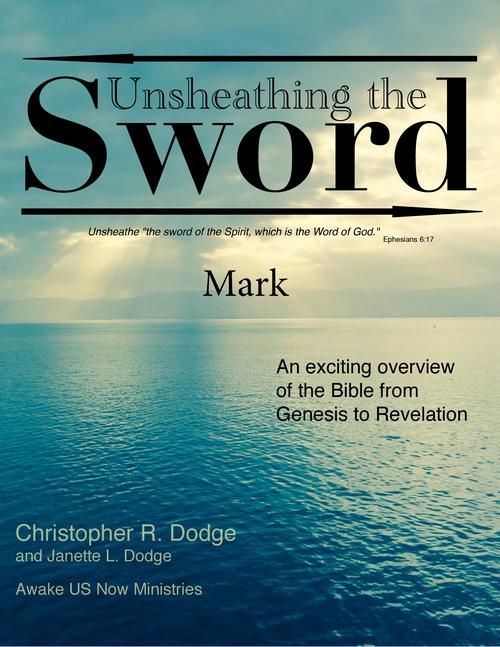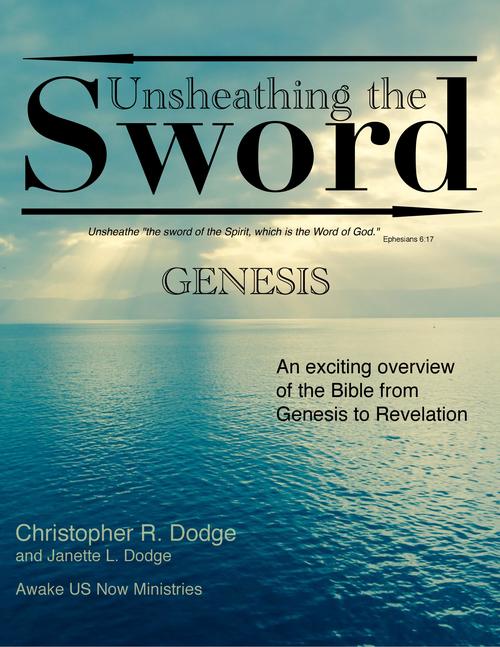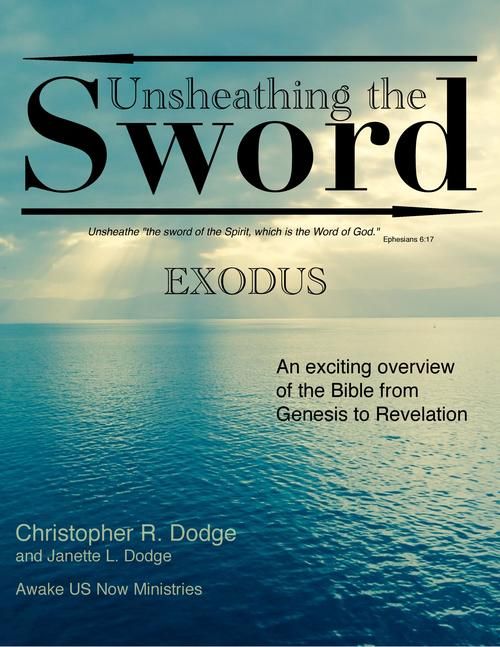Unsheathing the Sword - FREebooks
To download a FREebook, simply click each book's title or book graphic
These ebooks are written in language for all audiences rather than the academic community, although many of the cited sources are academic readings. The series is intended to lead everyone into the Word of God, in order to see God's Son, our Savior, Jesus, through the power of the Holy Spirit.
Several ebooks have been developed to accompany 3 of the books in the Bible: Genesis, Exodus and Mark.
For the video series Unsheathing the Sword teaching series (53 sessions) CLICK HERE or for the Bible in a Year series (53 sessions) CLICK HERE.
These ebooks are written in language for all audiences rather than the academic community, although many of the cited sources are academic readings. The series is intended to lead everyone into the Word of God, in order to see God's Son, our Savior, Jesus, through the power of the Holy Spirit.
Several ebooks have been developed to accompany 3 of the books in the Bible: Genesis, Exodus and Mark.
For the video series Unsheathing the Sword teaching series (53 sessions) CLICK HERE or for the Bible in a Year series (53 sessions) CLICK HERE.
The opening words of Genesis begin introducing a series of truths from God that are absolutely astonishing. In Genesis God reveals Himself as our Creator, who is near to us all. God is not distant. He is not far removed. Instead, God is near to His people as His Word declares. He is near to all who call upon Him. The New Testament is revealed in the Old Testament Scriptures and Jesus is the main character, even in Genesis.
The book of Genesis is a foundational book that sets the stage for everything that God has done, what He is doing, and what He will do. Genesis is a seminal work that is at the heart of the Bible’s message. In Genesis God reveals Himself as our Creator, who is near to us all. God is not distant. He is not far removed. Instead, God is near to His people as His Word declares. He is near to all who call upon Him. As we dig through the book of Genesis and take a look at some of the overarching themes and key teachings, we are encouraged, uplifted, and strengthened. Above all else, we see God’s great love for us – the Father’s love for us as revealed in Jesus our Messiah. The opening words of this book have much to say to us. They begin introducing a series of truths from God that are absolutely astonishing. It is commonly held in much of the Christian world that the New Testament is concealed in the Old Testament Scriptures. I would argue that the New Testament is revealed in the Old Testament Scriptures and Jesus is the main character, even in Genesis. In the first half of Genesis alone we cover the creation of the world, the fall into sin, the early patriarchs, and the Flood. Then we are introduced to the individual whom the Bible describes as the father of all who believe, Abraham. It is a massive amount of material, although some of the major themes are given just a short amount of attention. It leaves us wondering, “What about this?”
The book of Genesis is a foundational book that sets the stage for everything that God has done, what He is doing, and what He will do. Genesis is a seminal work that is at the heart of the Bible’s message. In Genesis God reveals Himself as our Creator, who is near to us all. God is not distant. He is not far removed. Instead, God is near to His people as His Word declares. He is near to all who call upon Him. As we dig through the book of Genesis and take a look at some of the overarching themes and key teachings, we are encouraged, uplifted, and strengthened. Above all else, we see God’s great love for us – the Father’s love for us as revealed in Jesus our Messiah. The opening words of this book have much to say to us. They begin introducing a series of truths from God that are absolutely astonishing. It is commonly held in much of the Christian world that the New Testament is concealed in the Old Testament Scriptures. I would argue that the New Testament is revealed in the Old Testament Scriptures and Jesus is the main character, even in Genesis. In the first half of Genesis alone we cover the creation of the world, the fall into sin, the early patriarchs, and the Flood. Then we are introduced to the individual whom the Bible describes as the father of all who believe, Abraham. It is a massive amount of material, although some of the major themes are given just a short amount of attention. It leaves us wondering, “What about this?”
Exodus is one of the foundational books of Scripture. It lays out the fundamentals of worship
of the one true God, who He is, how He works, what He does, and what that means for us. Genesis
ends in a graveyard with the death of Joseph, but Exodus ends with the glory of God coming down
on the Tabernacle as God’s people are in the wilderness, following His leading and guiding. It has
powerful teaching and powerful descriptions of God. When we talk about the book of Exodus, it’s
important for us to understand that this is a title that human beings put on this particular book
written by Moses. This is the second of the five books of Moses, the Pentateuch, and the title that
we use today in our English Bibles, “Exodus,†actually comes from the Greek translation of the
Hebrew Scriptures. The Jewish people knew this book by a different name, “Sh’mot.†The book
of Exodus begins with the phrase, “These are the names†(in Hebrew, “sh’motâ€). These are the
names of the individuals whom God brought through the time of trial into the land of the promise.
In Exodus we see God moving in a powerful way to save His people and to deliver them from
bondage. But more than that, what we have in Exodus is something that we see throughout the Old Testament Hebrew Scriptures. As God moves in history and as He reveals Himself, there are
profound instances where He makes Himself known in ways that are absolutely overwhelming.
Simultaneously, those things always point to an even greater reality. In the case of the book of
Exodus, we have the story of Israel’s deliverance from bondage in Egypt also pointing to an even
greater deliverance to come – the deliverance that will be accomplished by our Lord Jesus Christ.
As we look at Exodus (and all the Hebrew Scriptures), we look with the expressed intent of seeing
Jesus clearly portrayed in its pages and in its events.
The Gospel of Mark is the shortest of the four gospels. It is also the fastest moving and we are
going to see many examples of that. Before we dig into the words themselves I’d like to start with
some of the basics about who wrote it, when it was possibly written, and what the characteristics
are of this gospel.
The author is John Mark. As with the other gospels, we do not have something in the body of
the text that specifically names him as the author, but the uniform testimony of the earliest
believers is that this was written by John Mark. What Mark wrote down was what he heard from the Apostle Peter. So, although Mark
himself was not an eyewitness to most of the events recorded in the gospel, he got it from an
eyewitness. He is considered to be Peter’s interpreter.
It has been customary in recent years to date this gospel as the first to be written. Critics have
said it was probably written somewhere around 60-90 AD. However, the evidence of the earliest
believers and a growing body of evidence today would suggest that although it was written very
early, this is not the first gospel to be written. What is taking place is a revolution in our
understanding of when the New Testament books were written. People in the scholarly community
Unsheathing the Sword: Mark
5
are beginning to reevaluate many of the things they have accepted without question in the past.
The revolution is moving slowly, but it is indeed moving. It appears that the Gospel of Mark was
written quite early in Christian history and may well have been written as early as 45 AD or so.
As far as the content of this gospel, it is described by earliest witnesses as being Peter’s gospel
and it emphasizes Jesus’ actions as opposed to Jesus’ teaching. If you have a red letter Bible, page
your way through the Gospel of Matthew and then do the same thing with the Gospel of Mark.
You will notice that Mark has much more black ink because Mark especially emphasizes Jesus’
actions. Mark certainly quotes Jesus, however, he has far less of Jesus’ teachings than we see in
Matthew, Luke, or John.



